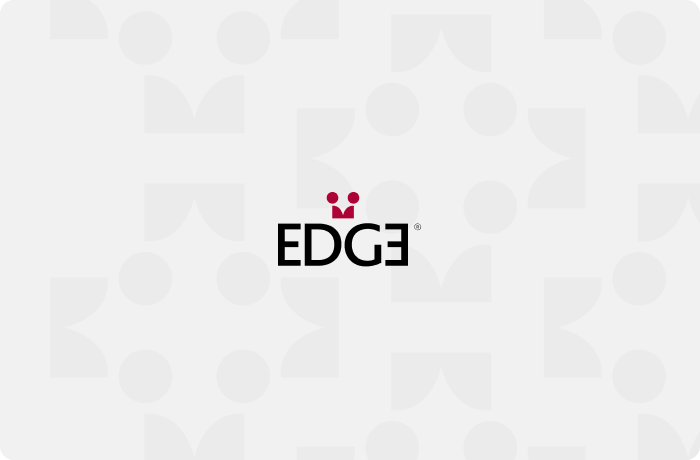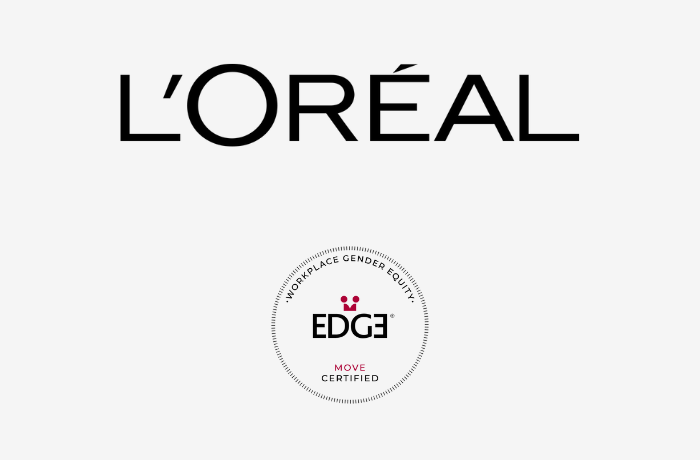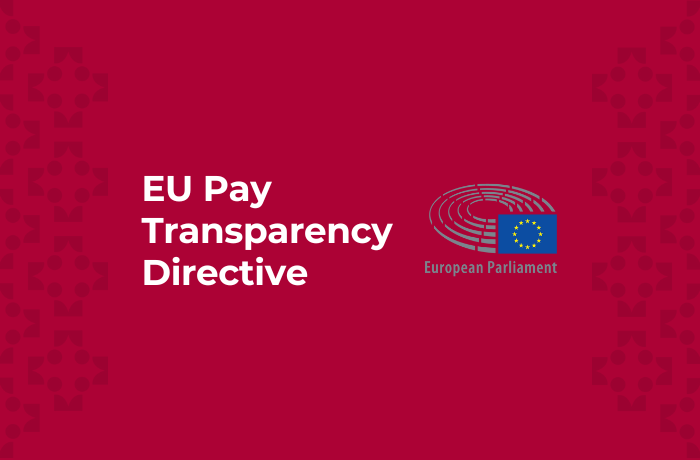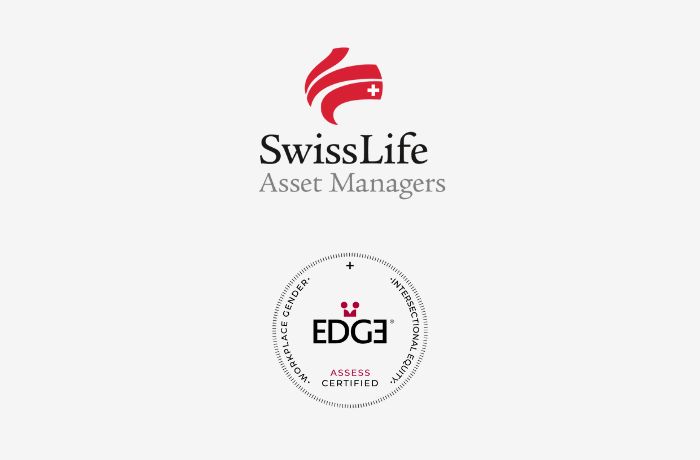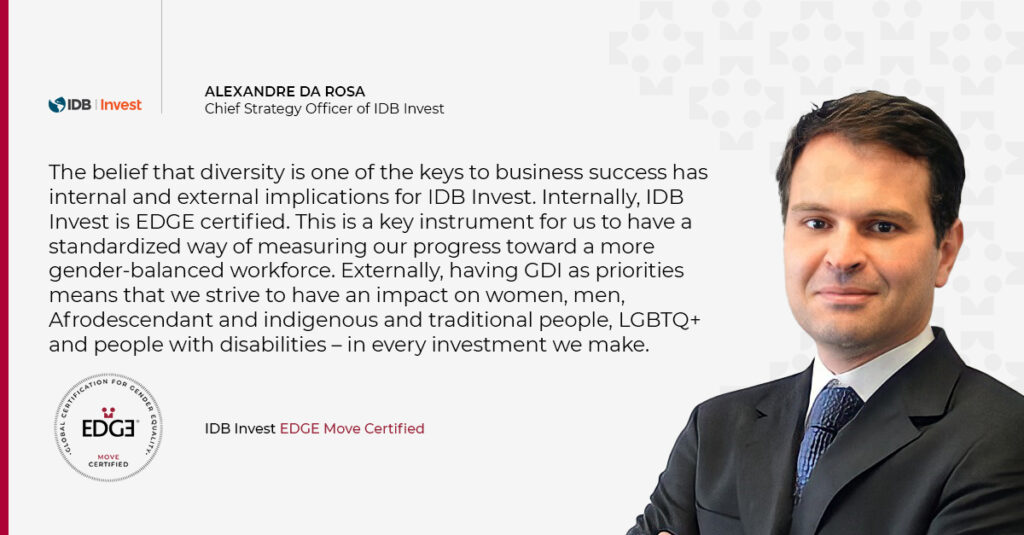
IDB Invest was among the pioneers to use a gender lens and engage in environmental, social, and corporate governance (ESG) investing. Why do you consider gender equality, diversity and inclusion (GDI) in the workplace as material criteria in your investment and financing activities? How has this changed in post-pandemic recovery?
Alexandre Da Rosa: Since its beginning in 2016, IDB Invest has considered gender equality and, more recently, diversity and inclusion, as universal priorities in its operations. The rationale behind this lies in IDB Group’s mission of supporting inclusive economic growth in Latin America and the Caribbean. This means that we support these countries and the private sector in their growth and development journey. Strengthening diversity and inclusion is one way of doing that. Research has shown that businesses that are led by diverse teams – in terms of gender and ethnicity – yield better results. Moreover, the companies with higher performance tend to have more women in line roles than staff roles. (McKinsey, Delivering through Diversity, 2018).
The belief that diversity is one of the keys to business success has internal and external implications for IDB Invest. Internally, IDB Invest is EDGE Certified. This is a key instrument for us to have a standardized way of measuring our progress toward a more gender-balanced workforce. We are very proud to have been EDGE Move Certified this July. Externally, having GDI as priorities means that we strive to have an impact on women, men, Afrodescendant and indigenous and traditional people, LGBTQ+ and people with disabilities – in every investment we make.
Having a workplace that promotes equal access to opportunities plays a key role in priority sectors like tourism, where women represent 60% to 70% of the workforce [1], and agribusiness. These industries are labor intensive, and women play an important role in them. For example, employee attrition can increase credit risk; hence, GDI are material in many of the priority sectors in which we operate.
The importance of increasing inclusion has taken center stage in a post-COVID recovery environment. The service sectors, which require physical contact and have been the most affected by the pandemic, account for 30% of female workers in Latin America and the Caribbean. Since the pandemic began, we have experienced a 17.7% decrease in employment of women compared to 13.1% for men. This is happening in a context where women dedicate between 22 and 42 hours per week to housework and dependent care, while men dedicate 15 hours. Furthermore, we know that men’s employment is increasing at a higher rate than women’s. [2] Diversity and inclusion were an “angle” that we looked at in our investment strategies, but they are now essential to ensure that our financing is meeting the needs of a post-COVID reality: We must promote women’s employment and flexibility in the workplace. This is a key part of IDB Group’s 2025 vision: the reactivation of the productive sectors supported by gender equality and diversity.
What are the most important factors that can contribute to the large-scale adoption of gender balance, diversity and inclusion in the workplace and on boards of directors as key ESG scoring and reporting indicators?
Alexandre Da Rosa: Any type of instrument that can help scale the adoption of diversity and inclusion actions needs to provide evidence that there is a clear commitment from top management and/or boards for having a more equitable and inclusive workplace, and that the commitment is followed up with action. Three features that can help to ensure this and inform an ESG scoring are financial materiality, standardization and verifiability of the instrument.
As for financial materiality, we know there is a link between diversity in leadership and financial performance. Multiple studies by financial institutions, consulting firms and academia have proven the correlation.
When it comes to standardization of metrics associated with scoring, it is important to ensure comparability across companies, industries and geographies. Our Women’s Empowerment Principles tool, a self-diagnosis tool on gender equality, allows companies from all industries, geographies and sizes to understand where they stand in their journey. It provides them with best practices so they can start implementing them. Initiatives like the 2X Challenge [3] and particularly HIPSO [4] are also great examples of the effort to standardize the way the private sector understands the impact of female empowerment and measures it.
Finally, results should be verifiable, which is where third-party certification becomes relevant. It is a way of providing assurance to an investor that whatever metrics are being used are supported by accurate data and concerted efforts to conduct business inclusively. This last point is key in a post-pandemic context. EDGE Certification is an effective tool, as it manages to reunite these three attributes, particularly the last one.
How is EDGE Certification contributing to advancing your ESG agenda with your portfolio companies?
Alexandre Da Rosa: As investors we promote GDI in our investments in different ways, depending on what is most material (workforce, value chains or markets) to our client. Regardless of the focus area, our recommendations are always actionable and have indicators that allow us to measure progress. Consequently, our end-to-end Impact Management Framework [5] allows us to assess the potential impact of each investment in terms of GDI, and track and evaluate the impact over time. In this context, EDGE Certification, as well as other certification programs that we support that target equality in the workplace, such as the Gender Equality Seal from the UNDP, have four characteristics that we value as investors:
The first one is benchmark. Certifications such as EDGE provide an assessment of where the company stands vis-à-vis dimensions of gender equality that have been globally validated by an array of stakeholders: academia, investors, companies, talent experts and gender practitioners. This methodology drives our clients to fight any unconscious bias and discrimination in recruitment, one of our ESG requirements on labor and working conditions. [6]
Second, it drives companies to act on their results, as they cannot obtain the certification unless they have adopted an action plan that addresses the gaps. As investors we are interested in ensuring that our clients have a clear roadmap with actions and KPI’s to accelerate their journey toward gender balance, diversity and inclusion.
Third, certifications are applicable to all industries and geographies, by benchmarking companies across the world.
Finally, it requires a third-party verification, providing investors assurance of the reliability of the results.
How have you implemented this in practice? Can you share some successful examples?
Alexandre Da Rosa: We have supported clients in obtaining EDGE Certification by either financing the EDGE assessment, the implementation of the action plan, or by working with our clients in the selection of the actions that make the most sense for them to implement to reach the next level in EDGE.
We are proud to see that Danper, a Peruvian agribusiness company that we initially supported to take the EDGE assessment, is now seeing the value of becoming EDGE Certified and has not only maintained but also continued the path to recertification by itself. Danper is now EDGE Move Certified. For IDB Invest, this is a sign of success: What we see as an instrument to accelerate gender balance and for development, is seen by the client as value added to its business.
In addition to seeing the value of meeting gender balance criteria, EDGE helped first-mover banks in closing the gap in access to financing for women to take a holistic approach to gender equality, by looking at how these banks are performing internally on their inclusive policies and practices. EDGE Certification confirmed that clients like BHD León in the Dominican Republic are on the right path to achieving gender balance, making sure that what they are doing externally to address women’s financial needs is consistent with their internal efforts of equality. Today, BHD León has more than 37% female representation in management positions with profit and loss responsibilities, well above other banks in the region.
Last but not least, we issued our own gender bond in Mexico in March of this year. Being EDGE Certified sent a strong signal to the markets: IDB Invest is 100% committed to gender balance both internally and in our investments.
What impact have you seen from your gender equality, diversity and inclusion in the workplace investment and financing strategies to date?
Alexandre Da Rosa: Our investments in gender equality, diversity and inclusion have put the conversation about diversity at the forefront of financial negotiations. For example, IDB Invest only invests in private equity funds that have at least one woman on the investment committee. This has sent a powerful signal to the market: For IDB Invest, having diversity at the highest decision-making levels will make our investments better.
In addition, the use of blended finance has helped to encourage our clients to measure their gaps in the workplace though our Women’s Empowerment Principles tool [7] – which is particularly relevant when our clients are early in their equality journey – to identify their gaps and implement programs that promote the inclusion of female minorities in STEM fields. In at least four companies across the region, IDB Invest has seen how efforts to recruit more inclusively have produced results beyond the incentives IDB Invest has provided for them to start working on these issues. We have seen companies now in their fourth year of internship programs integrating women engineers in areas such as solar design and software.
In addition to driving diversity in the fund decision-making process, IDB Invest is mobilizing resources to target women-led businesses through financial instruments such as social gender bonds. IDB Invest has issued more than five bonds targeting women-owned and led businesses in four countries in Latin America and the Caribbean in addition to our own IDB Invest issued gender bond. More importantly, financial institutions have come to IDB Invest for financing and advice on how to increase the share of women-led companies in their portfolios.
Blackrock’s announcement on their investment strategy and gender balance, the Bloomberg Equality Index or Equileap Equality Index are practices and instruments that are being adopted across the financial world. Gender balance, diversity and inclusion are core part of our mission, and we will continue to work and promoted them across the financial world.
References:
[1] IIDB, “Más allá de unas vacaciones: el turismo como fuente de empleo”, 2018.
[2] IDB, “Observatorio Laboral COVID-19: Un año de COVID-19: ¿Cuál es la magnitud de la crisis laboral?”, 2021.
[3] The 2X Challenge is a G7 initiative that calls for G7 countries and DFIs to collectively mobilize $3 billion for women’s empowerment. It sets criteria so investments can be considered as mobilizers of private investment for women’s empowerment.
[4] Harmonized Indicators for the Private Sector.
[5] For more information, see our report, Managing a Portfolio for Impact.
[6] IDB Invest’s investments must meet IFC Performance Standards. In this case, we refer particularly to Performance Standard 2, which addresses non-discrimination and equal opportunity.
[7] The Women’s Empowerment Principles Gap Analysis Tool, created by IDB Invest, IDB Lab, UN Global Compact and UN Women, is a free diagnostic tool that provides a free assessment of companies’ policies and practices impacting gender equality.

